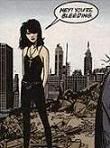| View previous topic :: View next topic |
| Author |
Message |
Gollum
Joined: 04 Sep 2003
Location: Japan
|
 Posted: Sun Jul 04, 2004 4:06 pm Post subject: I hate those big TOEIC Magazine-style study books Posted: Sun Jul 04, 2004 4:06 pm Post subject: I hate those big TOEIC Magazine-style study books |
 |
|
The Korean teachers at my school study from these big oversized magazine-type TOEIC study books, and teach from them too.
They are constantly asking me dumb questions from the books, which are written in such a way that no one would speak back home.
And I usually disagree with what the book says. Then they look at me like I\'m the incorrect one ... as far as they are concerned, these magazines are like the Bible. It really ticks me off.
Here\'s an example of the dumb sentences they have to answer:
Which of these is wrong?
1. Nothing else but you are the best man in the world.
2. Nothing else but you is the best man in the world.
Now obviously, we as native speakers would immediately say not to start the sentence with \"Nothing else\", but that\'s not even an option. They want a totally different answer as to why which one is correct.
Who would ever make a sentence like that, and why try to justify an incorrect sentence anyway?!?!!?! |
|
| Back to top |
|
 |
ulsanchris
Joined: 19 Jun 2003
Location: take a wild guess
|
 Posted: Sun Jul 04, 2004 6:09 pm Post subject: Posted: Sun Jul 04, 2004 6:09 pm Post subject: |
 |
|
| I think one of the greatest weakness in Korean made English books is that they use sentences and phrases but don't put them into context. Most writing in a korean made text book is never more than a paragraph or two in length. Koreans have tons of books on idioms but only apear in short little dialogs. Nothing even close to resembling natural speech. |
|
| Back to top |
|
 |
Eazy_E

Joined: 30 Oct 2003
Location: British Columbia, Canada
|
 Posted: Sun Jul 04, 2004 8:01 pm Post subject: Posted: Sun Jul 04, 2004 8:01 pm Post subject: |
 |
|
How about this one... I've seen the negative for "used to" written as "usedn't" instead of "didn't use to".
Considering the *beep* books they have to study from, it's a wonder Koreans can learn to speak English at all. |
|
| Back to top |
|
 |
oneiros

Joined: 19 Aug 2003
Location: Villa Straylight
|
 Posted: Sun Jul 04, 2004 8:10 pm Post subject: Posted: Sun Jul 04, 2004 8:10 pm Post subject: |
 |
|
| Eazy_E wrote: |
How about this one... I've seen the negative for "used to" written as "usedn't" instead of "didn't use to".
|
That's wrong?    |
|
| Back to top |
|
 |
prosodic

Joined: 21 Jun 2004
Location: ����
|
 Posted: Sun Jul 04, 2004 8:14 pm Post subject: Posted: Sun Jul 04, 2004 8:14 pm Post subject: |
 |
|
This sounds like the old "Man to Man" textbook. If it is, point out that it was written by a Korean at least three decades ago. Then ask them who seems more reliable, a Korean from the 1970s or a native English speaker from 2004. If you feel really ballsy, you may want to remind the person that the Korean didn't actually write "Man to Man." Rather, the person bought an English textbook in Japan and translated all the Japanese notes and instructions into Korean (yes, we would call that plagiarism in the west). In the process, some of the English got screwed up and a lot of it was wrong in the original Japanese book.
I agree with Ulsanchris that context is an important factor in understanding a phrase. At the same time, most Korean made English textbooks are filled with awkward and borderline nonsensical sentences. I think there are two main reasons for this. First, some of the sentences might have made some kind of sense according to English grammar of the 1940s. Second, and this is more often the case, the sentences were written by somebody who didn't actually know English well. |
|
| Back to top |
|
 |
some waygug-in
Joined: 25 Jan 2003
|
 Posted: Mon Jul 05, 2004 5:21 am Post subject: Posted: Mon Jul 05, 2004 5:21 am Post subject: |
 |
|
Context is everything. I hate those books too. Even when they do have good sentences, they are often using idioms but not in a proper context.
It's Ok, if the students are ready for this stuff, but trying to explain it to students who can't even figure out the past tense of think is quite frustrating.
Without proper context, it is impossible to tell which of several meanings a word can have. Then try to explain to them why it means meaning 3 rather than meaning 1. Aigo  |
|
| Back to top |
|
 |
ajuma

Joined: 18 Feb 2003
Location: Anywere but Seoul!!
|
 Posted: Tue Jul 06, 2004 4:45 am Post subject: Posted: Tue Jul 06, 2004 4:45 am Post subject: |
 |
|
| One thing you could do is find someplace (Uni/hagwon) that is offering a practice TOEIC test and take it yourself. It's a real eye-opener, PLUS it gives you a lot more credibility when you're talking with the Korean teachers. The cost is only W4,000 (well, it was 2 years ago) and it's well worth the time and money spent. BTW maximum score is 990. Good luck! |
|
| Back to top |
|
 |
OiGirl

Joined: 23 Jan 2003
Location: Hoke-y-gun
|
 Posted: Wed Jul 07, 2004 4:57 am Post subject: Posted: Wed Jul 07, 2004 4:57 am Post subject: |
 |
|
| ajuma wrote: |
| One thing you could do is find someplace (Uni/hagwon) that is offering a practice TOEIC test and take it yourself. It's a real eye-opener, PLUS it gives you a lot more credibility when you're talking with the Korean teachers. The cost is only W4,000 (well, it was 2 years ago) and it's well worth the time and money spent. BTW maximum score is 990. Good luck! |
That sounds like a really cool idea. Any suggestions on where to do this? Are they defensive about a native speaker taking the test, or cool about it? |
|
| Back to top |
|
 |
ajuma

Joined: 18 Feb 2003
Location: Anywere but Seoul!!
|
 Posted: Wed Jul 07, 2004 12:27 pm Post subject: Posted: Wed Jul 07, 2004 12:27 pm Post subject: |
 |
|
Call (or have someone else call) a couple of the universities in your city and ask when the next practice exam is. You've got to register beforehand (I think a week or so, but I don't remember), so you'll be able to gauge the reaction when you go to sign up.
I took the test at my own uni, so I don't know what it would be like taking it in an unfamiliar place, but most people, while suprised, thought it was a great idea when I explained why I was taking it.
When you register, be sure to find out how/when you can get the results. You may have to go back to pick them up or they may be nice and mail them to you.
Good luck! |
|
| Back to top |
|
 |
simulated stereo
Joined: 18 Jan 2003
Location: municipal flat block 18-A Linear North
|
 Posted: Wed Jul 07, 2004 3:13 pm Post subject: Posted: Wed Jul 07, 2004 3:13 pm Post subject: |
 |
|
| I took the test a couple of years ago. The listening part was so mind-numbingly boring that I had to force myself to stay awake. |
|
| Back to top |
|
 |
Demophobe

Joined: 17 May 2004
|
 Posted: Wed Jul 07, 2004 3:29 pm Post subject: Posted: Wed Jul 07, 2004 3:29 pm Post subject: |
 |
|
It's a TOEIC test. A technical examination of the rules of English. The questions aren't supposed to be cultural, common or in any way "what we would say". Go for a TOEFL text if you are looking for that.
If you teach TOEIC or have taken the exam, you would understand why the books read the way they do.
Students don't have our gift of 'just knowing' which answer is correct. They have to find the answer by going through the rules of English like a math problem. Even our taking the test isn't a fair indicator of what we 'know', I believe. 'Knowing' implies knowledge of, and I contend that many who speak English don't 'know', they are just 'aware'. Anyone can say "that's wrong. We don't talk like that", but not just anyone can tell why. It's this 'telling why' that is knowledge, not saying "it's wrong".
Our litmus test comes down to teaching it. If you can teach TOEIC well, then you have to have a good, thorough grasp of complex language and suddenly, those books make a lot of sense. There is no other way to write those sentences to give a clear example of the rules.
The sentences provided by the OP are actually quite difficult. For as much as many here could choose the right answer, could you explain clearly why you chose that, or teach the difference between them?
I know that many here could, but my point is that these books aren't meant to be a People magazine...they are methodical in presentation and written for academics only.
As far as hating those books, well, imagine if you had to know everything in them. Then you would really hate them. |
|
| Back to top |
|
 |
|

